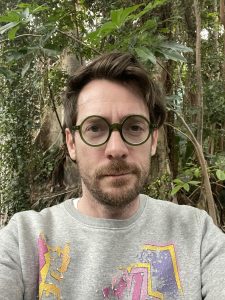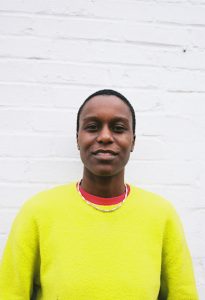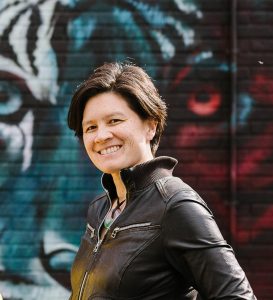To mark LGBTQ+ History Month 2023, we asked writers from Spread the Word’s community to share their advice for new and emerging LGBTQ+ writers. In this blog, Adam Zmith, Remi Graves and Shannon Yee share their top tips.
 Adam Zmith:
Adam Zmith:
No one said writing would be easy. In fact, it’s a deceptively fiendish exercise. There’s lots of advice about writing; most of it is true and also pointless. The one piece of advice that makes sense to me is: write. If you’re not writing, you’re not writing. So write. Just write.
I’m not sure I have specific advice for LGBTQ+ authors because we are so various and the things that hold us back are so specific to our personal identities and how we’re perceived, and because these things intersect with other parts of who we are. However, the one thing that we should do, as writers who are part of the LGBTQ+ families, is to be ourselves. Write what we know. This is classic advice to anyone, but for LGBTQ+ folx, it is especially true because our stories have often been left untold, or hidden. Our experiences have been second-guessed, our bodies forbidden, our desires silenced. So we have to find our ways, don’t we? Find our ways as writers to create characters who shouldn’t have to explain their queer relationships or their ‘niche’ sex lives. Find your way to write what you want and, remember: do, actually, write it.
 Remi Graves
Remi Graves
Much of the following advice I need to take myself, but I’ll share it nonetheless.
Writing a terrible first draft is less terrible than imagining an amazing one! Don’t put too much pressure on yourself to write a stunning sentence, write an ok one, and go from there.
When I’m stuck in a rut, I go for a walk, or I read. Preferably something I love that can get my mind moving. It’s years of reading that gave me the courage to try and start writing for myself. I would say I’m a reader first and it’s what I come back to when I’ve lost a bit of faith or direction in what I’m trying to express on the page. If you can build reading into your writing practice, it’ll be more fun and inspiring!
I’m less and less convinced by the harsh ‘if you don’t write everyday you’re not a writer’ motto, and I’m much more drawn to the idea of writing as a kind of thinking, and thinking as another kind of writing. By this I mean meeting up with a friend, or going to a gallery, or staring at the sky can all be ways to help with the thing you’re writing. Life surges through our work, so we need to make sure we’re living.
I’m not sure what LGBTQ+ advice is if I’m honest, though I will say try to write against feelings of ‘I shouldn’t write about that’, or that’s too trans, too queer or too gay to write about. There’s no such thing. I would also say write about whatever you want, don’t feel pressured into writing specifically ‘queer’ work because of other’s expectations or preconceptions. Your practice is yours. That being said, finding other queer writers (on the page, or in the world) is also a great way to expel the suppression police from your writing practice and to help you explore the breadth of possibilities for your own work.
I’d say sharing your work with queer circles is a nice way to start off feeling understood without having to translate yourself. Try and find an open mic or reading group where you can share your work, getting it out in the world gives a whole new life to whatever you’ve written, and can help keep you inspired too. Check out these links for places to share, hear, or workshop your writing:
PRIM: Black queer reading group
Fourteen Poems – Queer Anthology
 Shannon Yee:
Shannon Yee:
Show up, show up, show up to the page. Stare at it, rage at it, be shit on it, be brilliant on it, but be in front of it in some way, everyday. Take notes also on what you notice about yourself and your writing habits or preferences. Get metacognitive about your writing craft—think about how you think. This is how you hone your skills and find forgiveness on the days where it’s not working quite right and celebrate the times where it is. When you’re totally stuck, physically move—go on a walk, cook something, do yoga; your mind will work things out in the background. There are two components to writing: there’s the act of articulating your thoughts on the page and then there’s the process of reading it over with an audience’s perspective to ensure that you’ve said what you wanted to in a way that makes sense. Publication is a whole other ball game; it’s business. As writer Anne Lamott says in Bird by Bird: Instructions on Writing and Life (Knopf Doubleday Publishing, 1995) , “… publication is not all that it is cracked up to be. But writing is. Writing has so much to give, so much to teach, so many surprises. That thing you had to force yourself to do — the actual act of writing — turns out to be the best part.” Good luck!
About the contributors
Adam Zmith (he/ him) is the author of Deep Sniff: A History of Poppers and Queer Futures (Repeater Books, 2021). He is also the writer and producer of the BBC podcast series The Film We Can’t See, a co-producer of The Log Books podcast, and co-director of the podcast production company Aunt Nell. He’s always working on a novel, and right now is also writing more non-fiction books including one about foot fetishes. Adam is an alum of Spread the Word’s London Writers Awards and won the Polari First Book Prize in 2022.
Remi Graves is a London based poet and drummer. A former Barbican Young Poet, Remi’s work has been commissioned by St Paul’s Cathedral, Barbican and BBC Radio 4. Remi has taught at The Poetry School and performed at Cheltenham Literature Festival, Tate Modern and more. Remi’s debut pamphlet with your chest was published by Fourteen Poems in September 2022. Remi is currently a lead poet on Spread the Word’s Uprising and Resistance project, and is part of Deptford Literature Festival on Saturday 18 March 2023, co-headlining Queer Poetry Night on Saturday 18 March.
Shannon Yee (Sickels) is an award-winning writer and producer. Her perspectives as an immigrant, ethnic minority, queer artist-parent with a disability living in NI are deeply embedded in her work. Shannon has received a number of awards and grants, including the ACNI Major Individual Artist Award (2017). Her Reassembled, Slightly Askew sonically immerses audiences in her autobiographical experience of nearly dying and subsequent acquired brain injury (www.reassembled.co.uk) , touring locally, nationally and internationally in arts festivals and medical training settings since 2015. Shannon’s published short stories are ‘The Brightening Up Side’ (Belfast Stories; Doire Press, 2019), and ‘Thumbnails’ (Queer Love: An Irish Anthology; Southward, 2020). www.s-yee.co.uk. Shannon is a part of the CRIPtic x Spread the Word Writers Salon community.
You might also like:
Triangle Queer Poetry Night at Deptford Literature Festival
Identities and Nature at Deptford Literature Festival
Published 8 February 2023